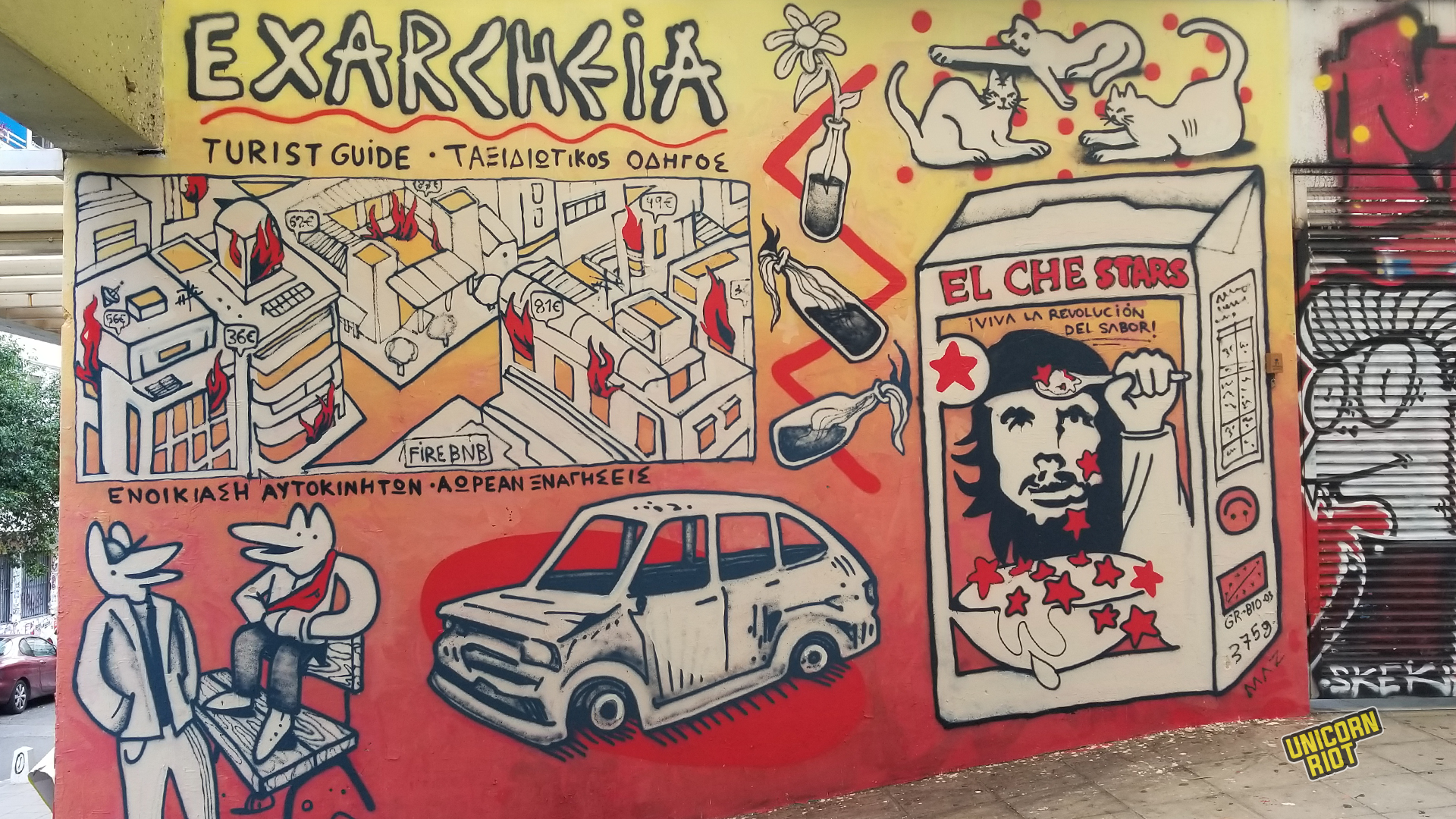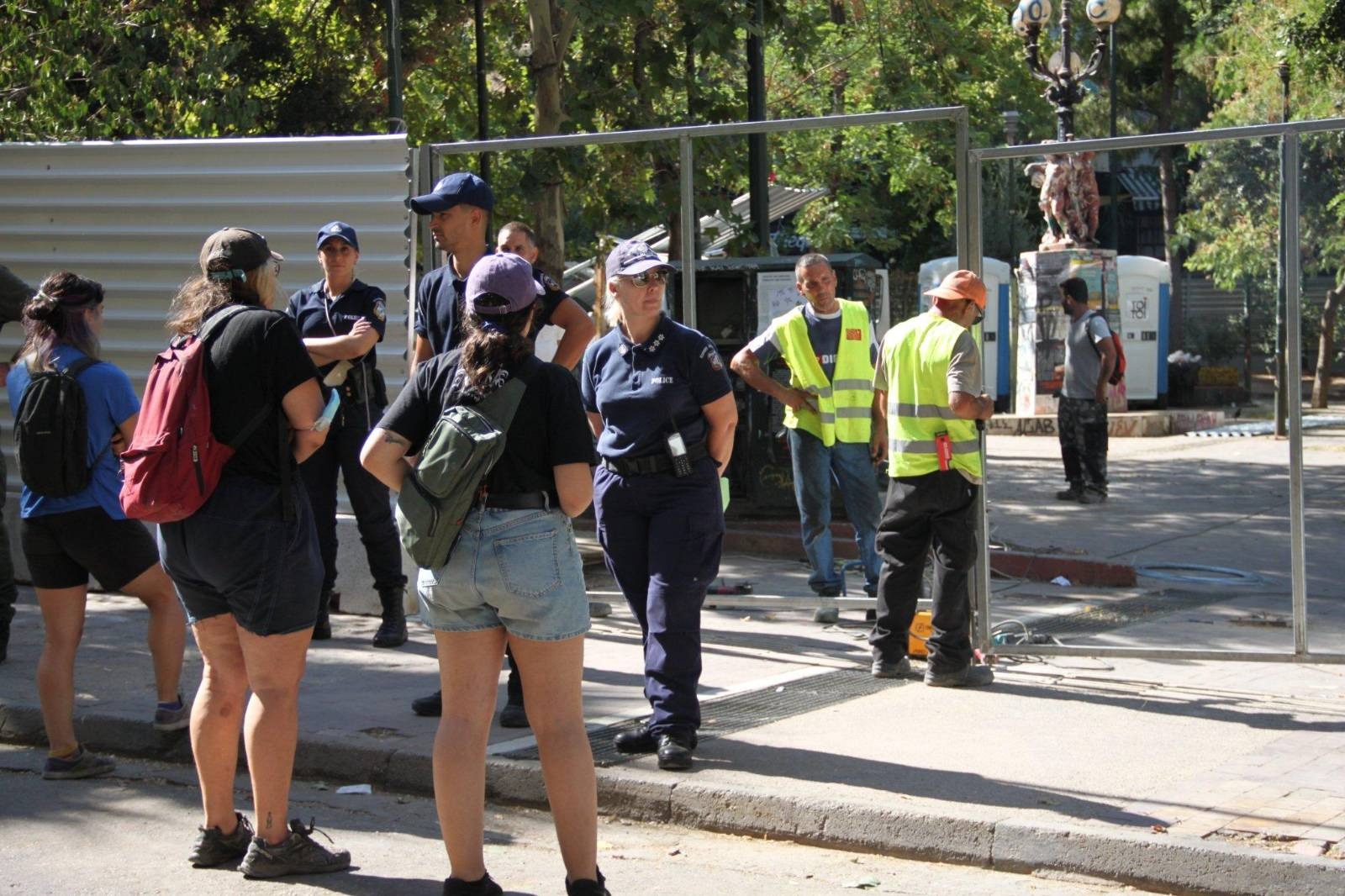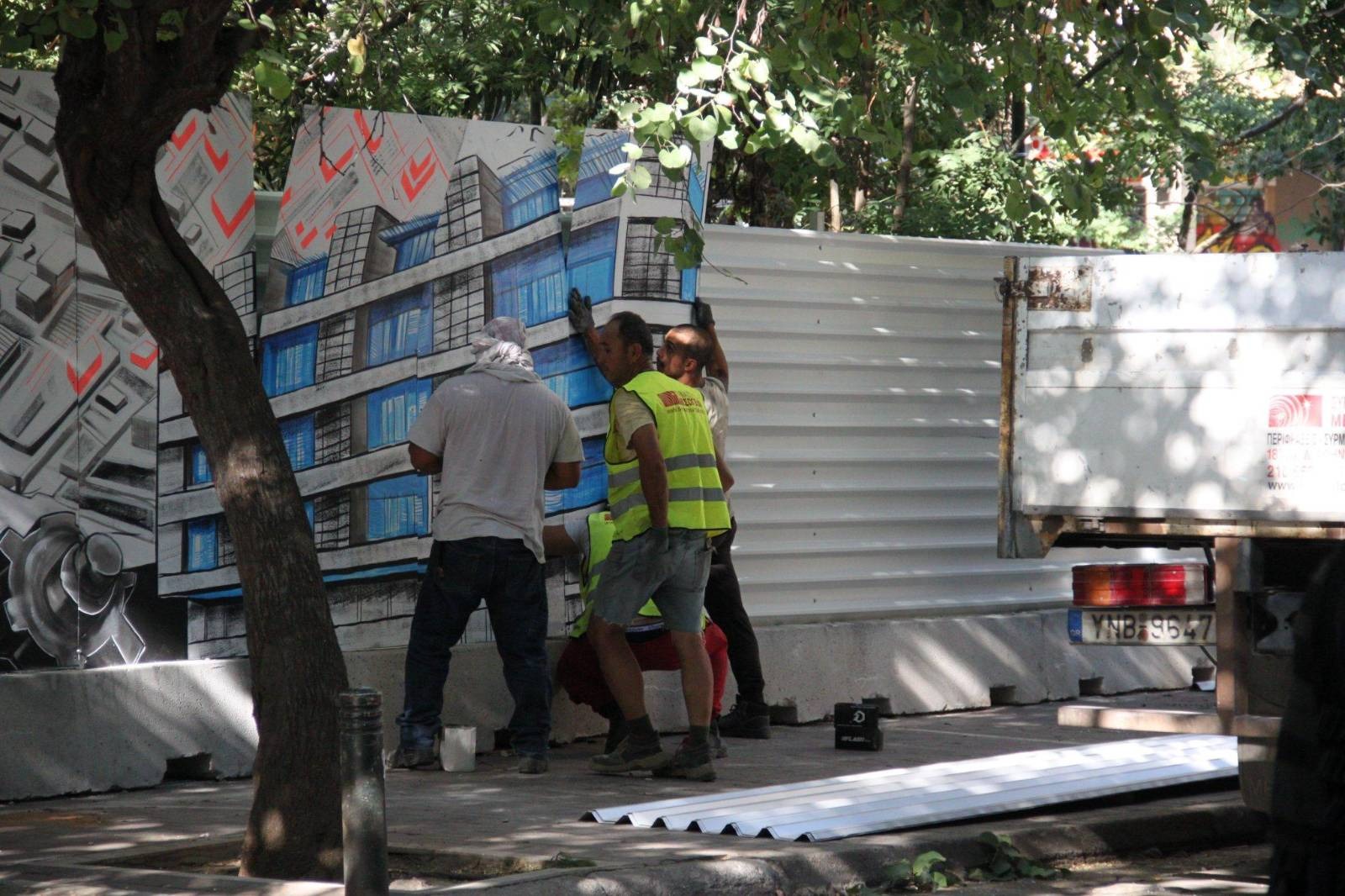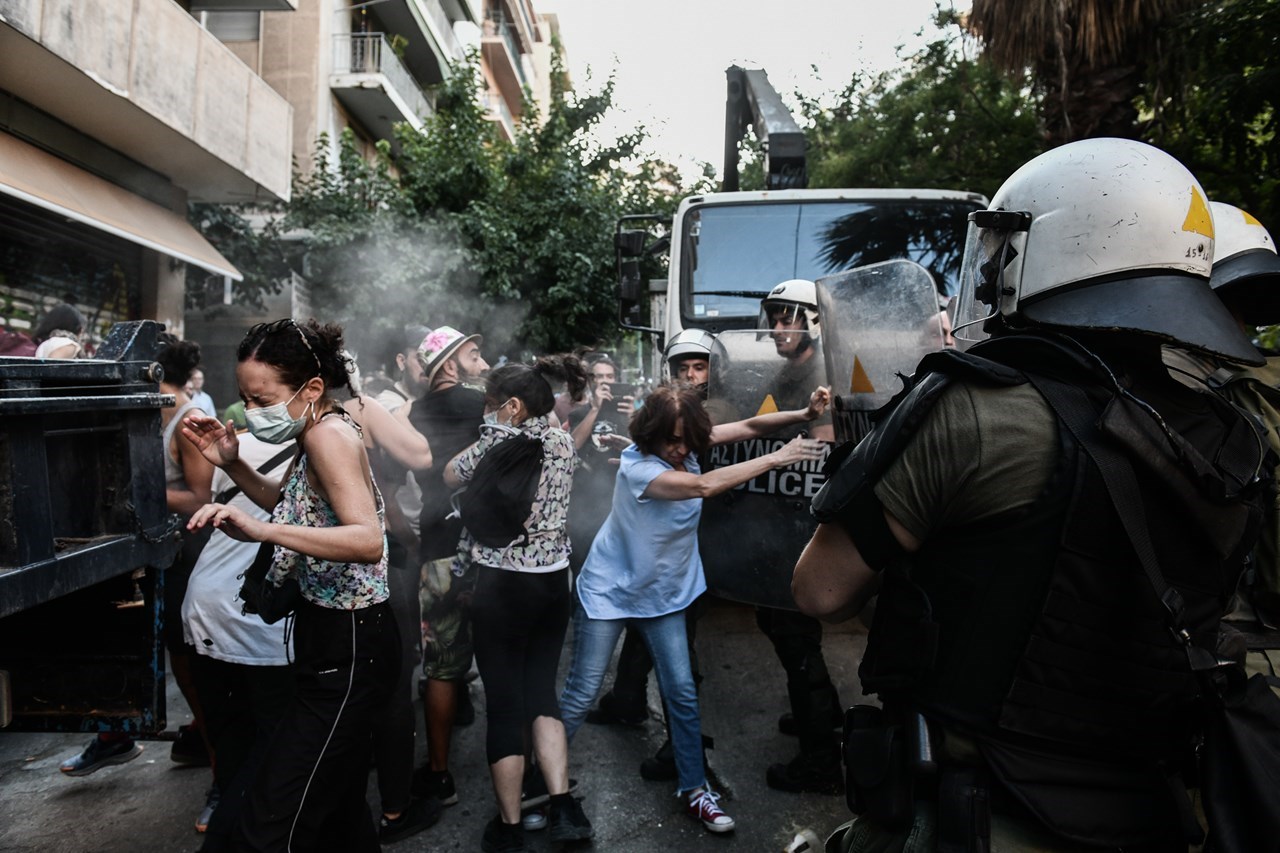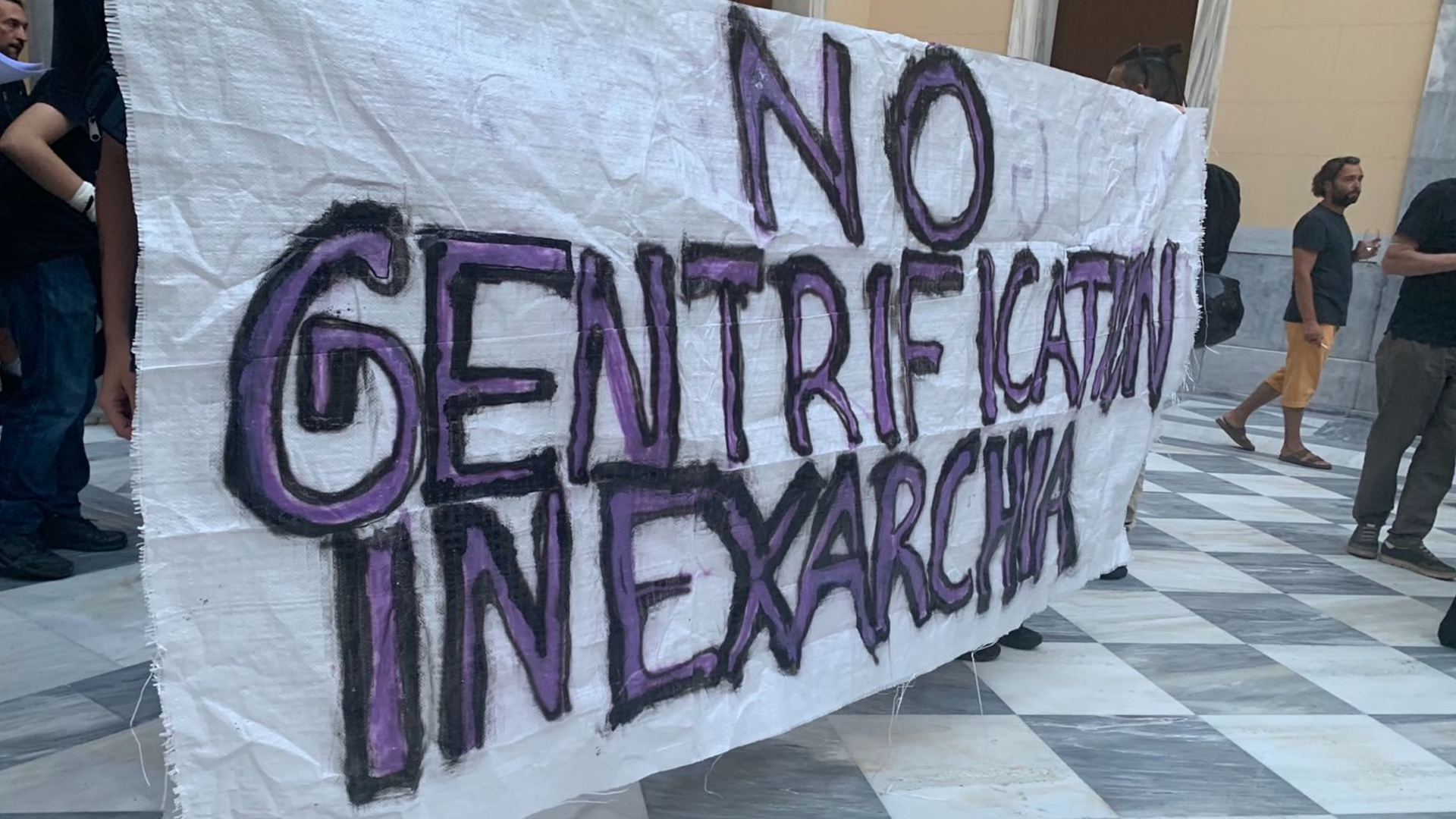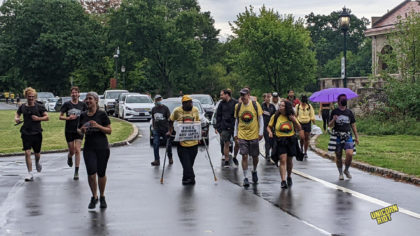Gentrification Endangers Historic Exarcheia Square
Commentary for our ‘Gentrification in Greece’ Series
Athens, Greece – Two things have been steady and invariable in Greece the last decades, the fine weather and nepotism. Even as the first starts to change due to the climate crisis, the second seems untouchable and intact. Once again, members of the Mitsotakis/Bakoyannis family lead the Greek ship to unknown neoliberal waters. Media monopoly, extreme privatization, autocratic control and catering to Western wants in the international chessboard are the pillars of the New Democracy regime, which floats between numerous scandals touting the audacity to ignore extensive corruption and political crimes.
Through clientele relationships and fast tracked secretive procedures, austerity, inequality and social despair rise to new heights, keeping a stern hand against the denizens of this reality and using modern handbooks for the passive supporters. A common global title in the table of context of these handbooks is gentrification. This piece, which examines short-term rentals, ‘touristification,’ and right-wing development strategies in Exarcheia, Athens, is the first in a series on gentrification in Greece.
Part 2 – The Different Facets of Gentrification in Greece and Beyond
Part 3 – Altering Exarcheia From the Square to Strefi Hill: A Timeline and Film
This article is a commentary piece reflecting lived experience, research and local perspectives written by an Exarcheia resident. The views and opinions expressed don’t necessarily represent those of Unicorn Riot.
Exarcheia: Radical Athens District Pressured by Gentrification
Accelerated by the country’s far-right government, gentrification has been in full swing over recent years in Greece. One of the main targets has been the historic Exarcheia district, just a mile away from the Acropolis in downtown Athens. Since the late ’70s, Exarcheia has been the epicenter of political and cultural activities in the city, and on a symbolic level in all of Greece.
On August 9, 2022, amid community uproar, police and municipality workers blocked off the central square in the district (Exarcheia Square) with metal panels to begin constructing a new metro station, which may take up to eight years. This move has garnered pushback, and coupled with the district movements against Airbnb and gentrification, there could be some contentious moments coming up in the district known for its radical movements.
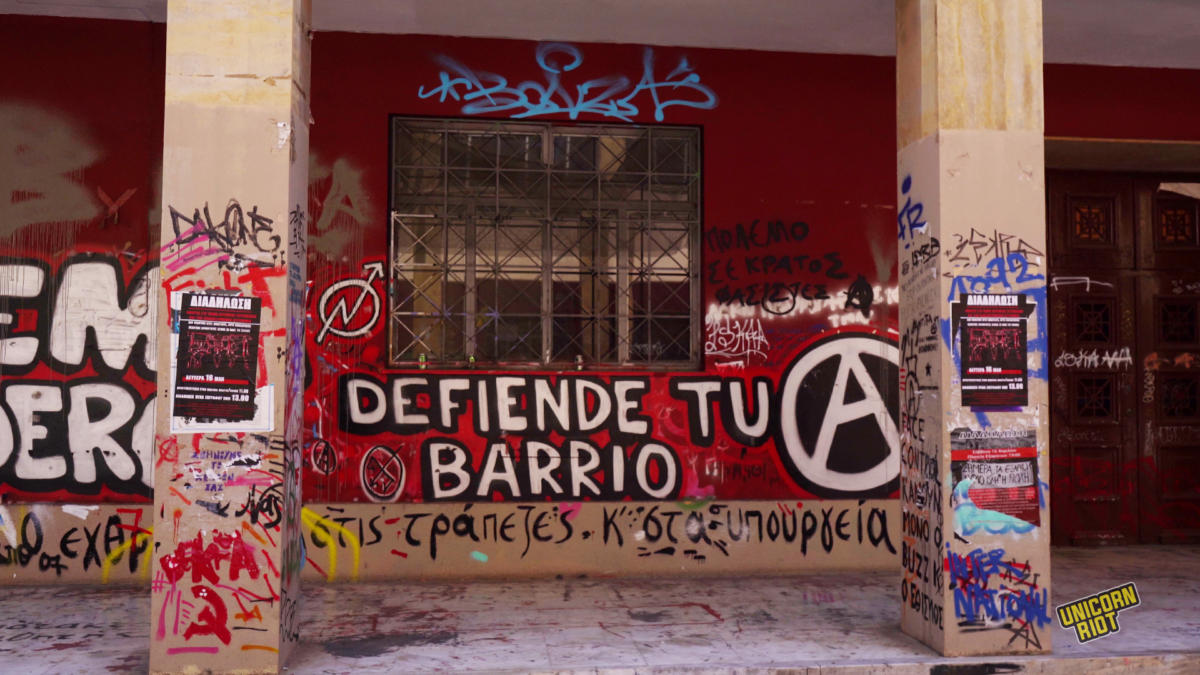
The name of Exarcheia has been known for awakening dreams, quests and wild expectations in people who questioned this world and tried to change it. Adversely, it raises concern, anxiety and nightmares to the authorities who tried to keep the world bound to the directions they planned.
The people, the structures, and the events that have happened inside and around Exarcheia Square have produced a history of multicolored or multi-leveled struggles, imaginative creations and a never-ending flux of thoughts and ideas which have shaped the radical, social, and political movements in Greece and beyond.
The social centers, squats, bookstores, places for the arts (like cinemas, theaters and music venues), the cooperative ventures, printing presses and self organized publishing houses, the street culture — from its musicians to graffiti — and street parties, benches or kiosks in the square where brochures, flyers or political books were present, collective kitchens, and the countless demos and nights of fire against the political repression.
That repression has been trying mightily to conform the neighborhood for four decades now as an infinite amount of groups of all interests that operate in the area have expressed they’ve felt the warm welcoming embrace of Exarcheia and constant inspiration from its character. Inevitably this place of constant questioning, protesting and resistance has been a thorn in the side of the authority bent on its removal.
Unicorn Riot previous reporting from Exarcheia includes: A self-organized clinic and dentistry called ADYE; The first squat for refugees and migrants Notara 26; Community defense of the district; coverage of protests on 10-year anniversary of police killing of Alexis Grigoropoulos; Horizontally-organized independent media collective OmniaTV and more.
The Elements of Gentrification as a Weapon
As a weaponized tool, gentrification is achieving something today that the government’s been trying, but failing, to accomplish through police repression using SWAT teams and undercover cops for the last 40 years in Athens.
The sneaky process of gentrification, especially in its early stages, delivers a fast-track shock treatment to the locals who, taken by surprise, realize the ongoing phenomenon after it has been established as a reality in the area. The warnings of travelers from abroad at the beginning of 2013 or even earlier about the threat of gentrification arriving in the neighborhood through their lived experiences in other places, echoed like distant strange things unconnected with a still-hopeful local reality (Syriza was not yet in power to blow over the steam of hope).
For residents in Exarcheia, the middle of the last decade was the beginning of the realization that something drastic was happening in the neighborhood and an imperceptible change was in the air.
The first noticeable element of gentrification present in the neighborhoods was real estate, especially short term rentals through the widely used platforms Airbnb and Booking.com.
Airbnb started as a counter-proposal of a ‘sharing economy’ against the financialization and high living cost that Silicon Valley brought to San Francisco, preceded by online couch-surfing sites. It was quickly taken over by huge real estate companies and corporations, and other powerful entities like banks and universities which turned to real estate as a safe source of high-margin profits.
Exactly the same happened in Greece and consequently in Exarcheia. Subletting rooms or apartments for short-term profit through the Airbnb platform appeared a temporary solution for many Athenians who tried to cope with the economic crisis by generating extra income. A vicious cycle of austerity in Greece over the last 14 years has negatively impacted the economy at the expense of the poorer populations with the pandemic worsening conditions.
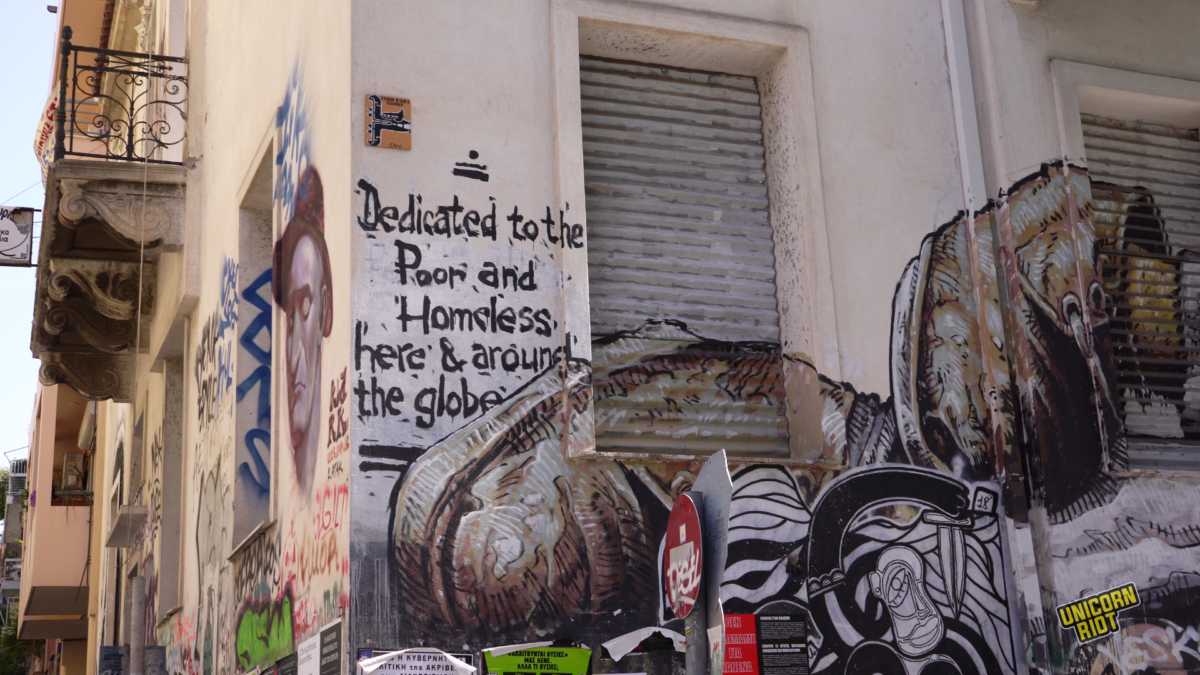
Yet, it soon became clear that big companies and corporate real estate funds would control the business, leaving no space to small players. Since 2019, 51% of short term rented houses listed in Athens featured portfolios of commercial operators and foreign investors, percentages which rose during the years of the pandemic. (In 2019 Exarcheia had around 700 Airbnbs.)
As the platforms’ popularity soared, personal ownership of homes and using Airbnb for extra financial well-being was deemed as a ‘solution’ by their boosters. Historically, residents born to Athenian families have had homeownership based down through the family. Yet quickly, global investors, including property management companies, real estate firms and construction and financial companies, dominated the platform.
In September 2020, a worldwide decrease of 65% in tourist arrivals were recorded. Airbnb reorganized itself as a platform promoting houses as alternative locations for quarantine or remote work. Thus, by extending the short-to-mid term rental and adding the ‘long stay’ option on their website, it created another option for profit.
The voices of residents who were Airbnb-ing in 2015 to add an extra stream of income to get by were soon eclipsed by the sound of renovation and reconstruction of entire neoclassical buildings just for Airbnb and apartment hotel use.
Places like apartment hotel PAME Paradiso, (see their Airbnb listing here) are within three minutes of Exarcheia Square. It’s run by Lenny & Soul with the catch phrase, “Let’s do some Living.” Lenny & Soul had previously described themselves as a dynamic real estate company set up by Israeli friends who provide up-to-date investment opportunities to a number of foreign investors, mostly Israelis. The group mostly buys up entire buildings for groups of flats, divides them into apartments, renovates and furnishes them, turning homes into their high yield profits. The company manages over 70 properties, cutting 100 real estate deals in just five years.
After Airbnbs and hotel apartments, which were growing like poisonous mushrooms in Exarcheia, further symptoms of gentrification are luxury apartments geared for the heavy purses of high-cultured artists and digital nomads.
Residents report they’ve been watching all of this while feeling that it was as if they were in an unfinished movie with an unhappy ending — the opening titles written only in English on the shops and bars of Exarcheia, shot in tourist color.
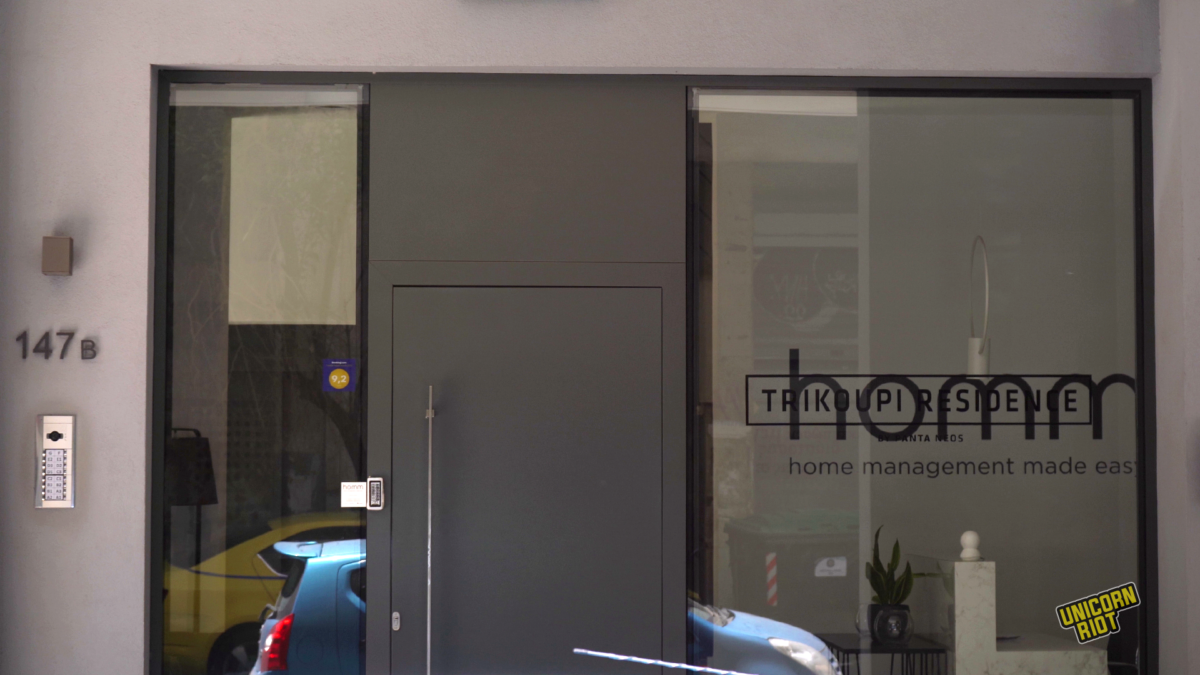
Touristification, a Catalyst of Gentrification
Touristification is a main catalyst of the gentrifying process in Athens and unavoidably in Exarcheia. Before becoming a ‘smart city’ and starting to sell its character in cheap holiday packages, Athens was a transient city. People were visiting to travel to islands and other parts of Greece, staying in the capital for some hours or a day or two to visit the smog-filled air of the Parthenon and gyro or tzatziki in Plaka (neighborhood of the Acropolis).
Athens is now the epicenter of touristic activity in Greece year-round. Big hotels work hard to grasp the latest tourist trends in order to create lucrative business opportunities, furthering tourism as the growth engine of the Greek economy.
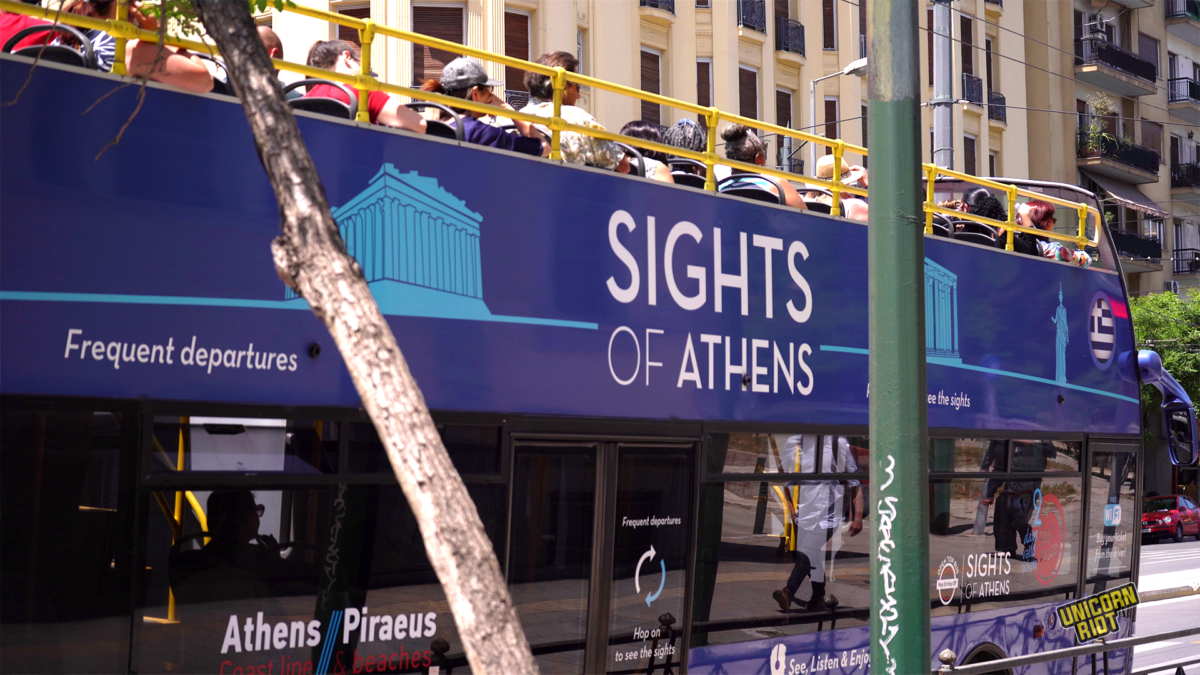
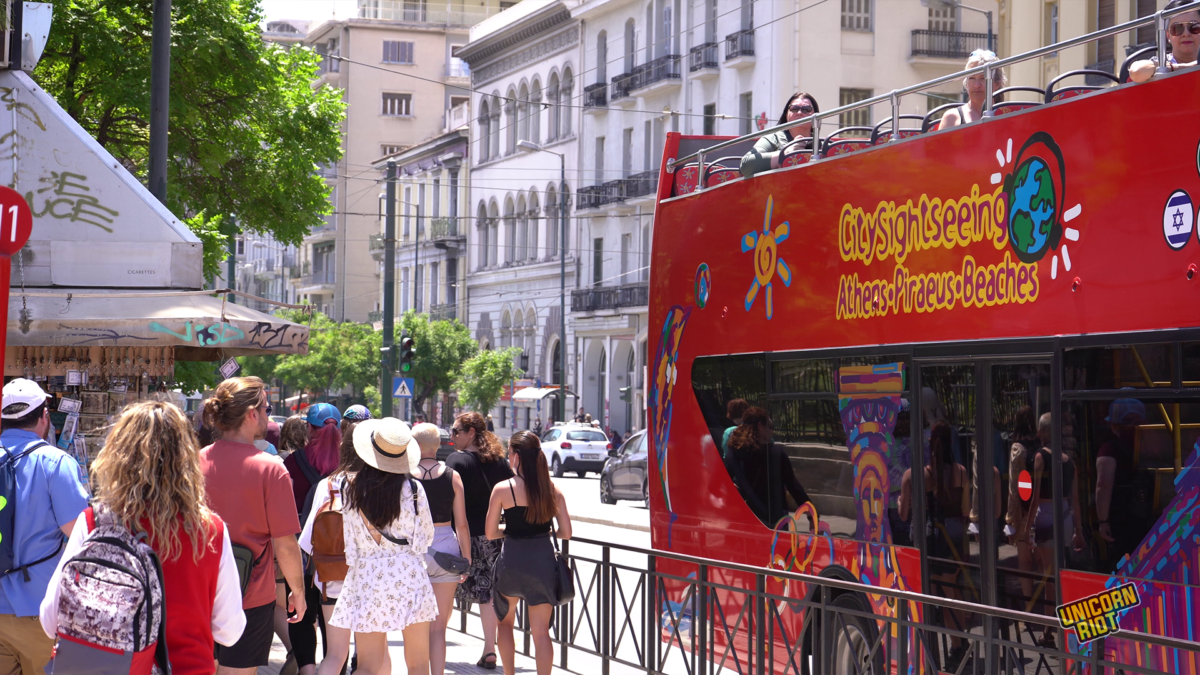
Businesses use marketing in attempts to reveal ‘the authenticity’ that is expressed mainly in downtown and notorious Exarcheia, claiming they are offering the authentic experience of the inner city through the physical and social engagement in a safe and protecting manner. This allows the customers to smell the grit while battling their insecurities that accompany Exarcheia’s reputation of crime and violence following many years of state propaganda and efforts to diminish the neighborhood.
The artistic world has contributed the most to this direction as they open the road to a crowd with social and cultural sensitivities which inspire them to pursue Athens as their new Berlin and Exarcheia as a progressive canard. This has been a more obvious progressive thing in the last few years with the art exhibits Biennale in 2015-2017 and later Documenta in 2017, during which Exarcheia rooftops were turned into highly decorated lofts to host curators, participants and their conclaves.
The picture of an empty small shop in Benaki Street during the Documenta days supposedly symbolized the emptiness of the commercial society, reflecting the void that started to surround the once-colorful and meaningful Exarcheia. This cultural and aesthetic homogenization that gentrification brought to the area is getting more visible since the state’s closing of the Square for construction of the metro station.
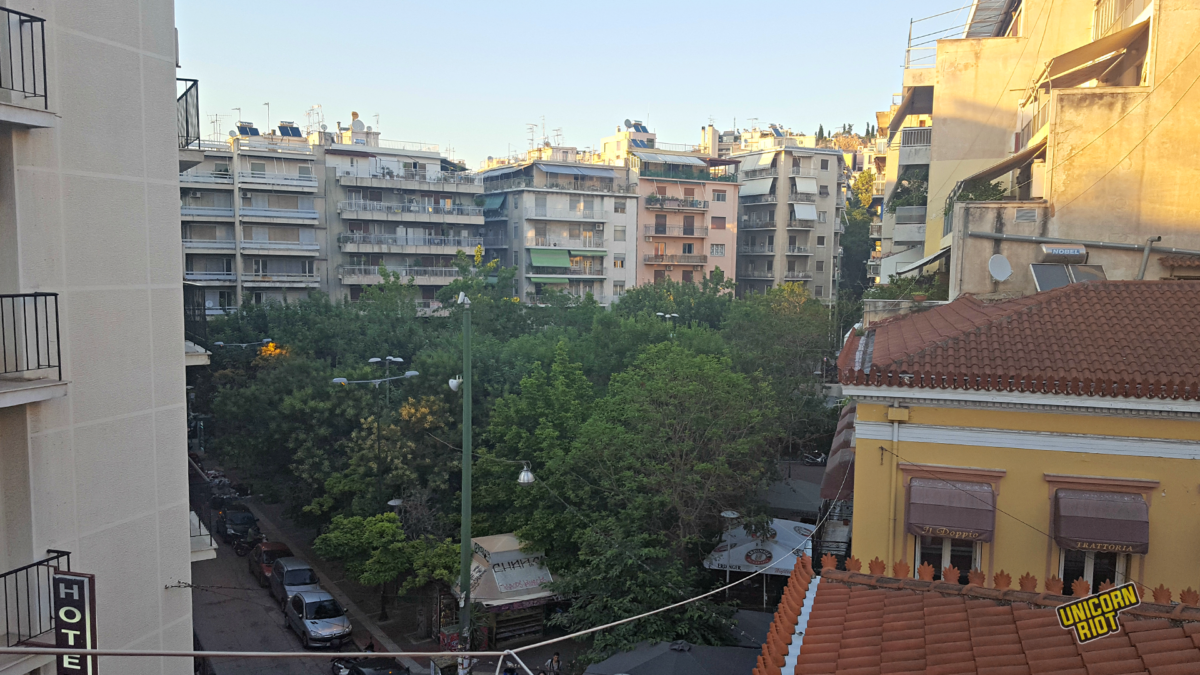
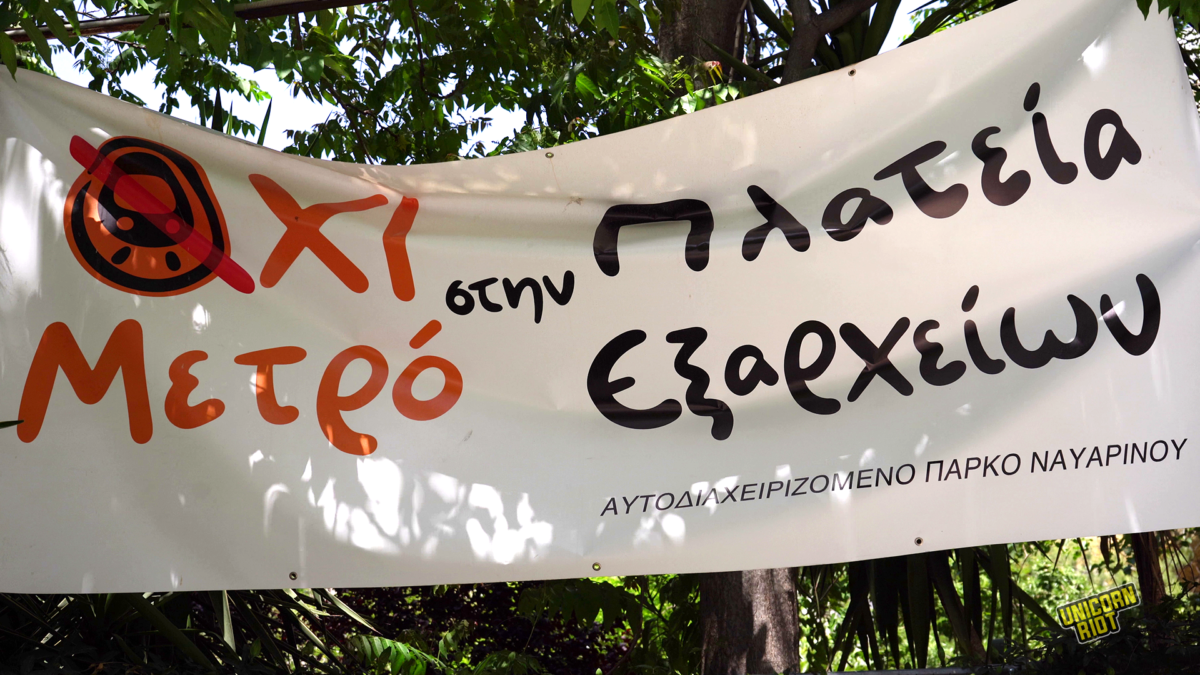
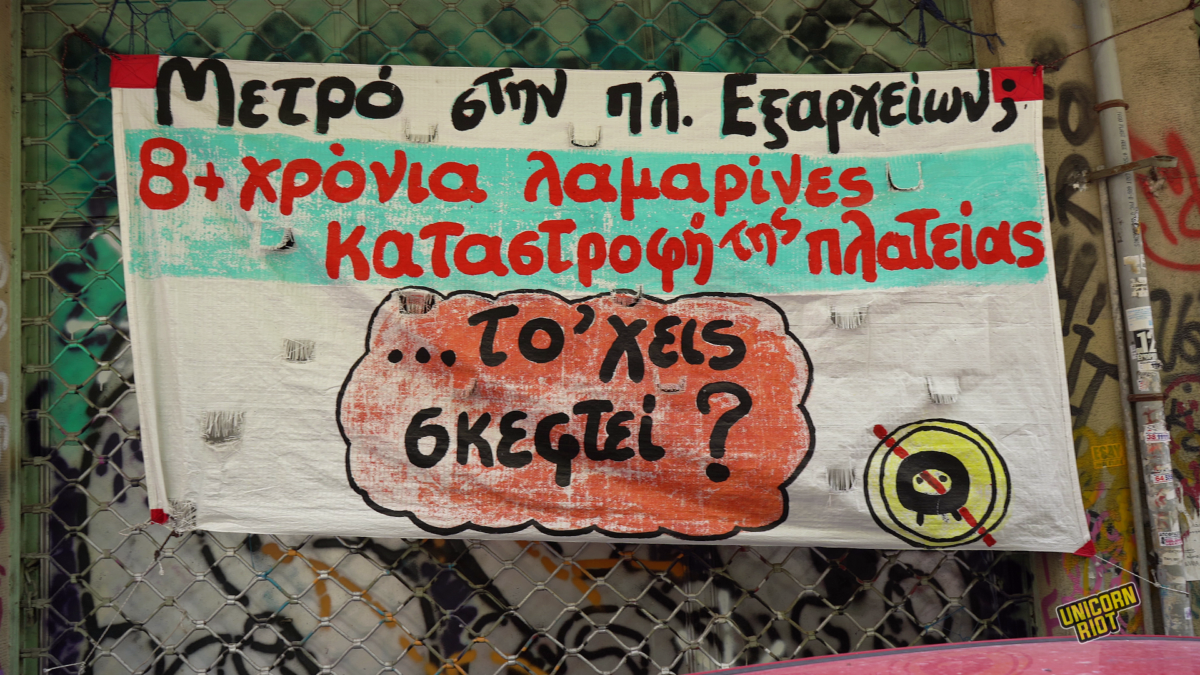
Metro Station Planned for Exarcheia Square
Since 1906, Athens has had an overground electric train which connected it with Piraeus and the port. In 1991, Attico Metro S.A. started constructing lines 2 and 3 and gave the biggest parts of them to the public in the beginning of 2000. The trains were created with the impending 2004 Olympic Games in Athens and many residents believe it wasn’t intended to improve the unbearable traffic jams and the smog, but to prepare for the corruption and bribery that the Olympics would bring.
Extensions of the lines are currently being constructed and the new line 4 was put forward at the end of 2021, aiming to finish by 2030. Line 4 is the line that covers mostly the center of the city, including Exarcheia Square among new stations.
Abstractly, most are in favor of the metro as an ecological transport defying the dictatorship of a car, reducing pollution and providing equal access to all. Yet, metro stations have become panoptical crossings with security guards, expensive tickets and a sterilized commercial environment totally detached from the neighborhood of which its construction invades the very core fabric.
In the present metropolis, an announcement for a new metro station is simultaneously a strong indication for the beginning, or the continuation, of the gentrification process. The transformation of the metro from a green-mode of transportation, all-inclusive, common societal need to a harbinger of gentrification is global. Gentrification in Exarcheia has an extra element to this rule, the repression and extinction of its character.
In August, bulldozers entered the Square and cut trees while construction workers with masked faces set iron walls around it. The Square’s central iconic statue, the Three Erodus, have felt, heard and seen most of the hope, heartbeat, agonies, smiles and tears of the radical nonconformist and happy people that flowered in the beach under the pavement of Exarcheia, but are set to be removed permanently. The far-right government seeks to finally end the symbolic nature of the Square after previous governments failed to stamp out anti-authoritarian perspectives.
Since the beginning of the New Democracy government, it has been publicly stated they aim to change the culture of Exarcheia, and will do it with a metro station while destroying the space and symbolism. The Mayor of Athens, Kostas Bakoyannis is the nephew of the Prime Minister Kyriakos Mitsotakis. (Bakoyannis’ father was assassinated by a leftist militant group called ‘November 17’, which was considered a terrorist organization by Western governments when it was active.)
Their family history plays a part in their modern goals to erase open social spaces that are breeding grounds for struggles based inherently around no hierarchy. The family’s rise to political prominence is a familiar story in Greece, as there have effectively been three families that have governed the country since World War II. All three share extremely conservative neoliberal tendencies with a pure hatred for leftist, anti-authoritarian and anarchist practices while pushing to diminish Exarcheia and terminating its symbolic power to teach, inspire, and act unconditionally.
Many residents point out the metro could be built a few hundred meters from the square next to the Archaeological Museum and the Polytechnic University. They note the only square in the neighborhood, with its trees and green parts, is slated for removal, conducting another ecological crime in the heart of the cement jungle.
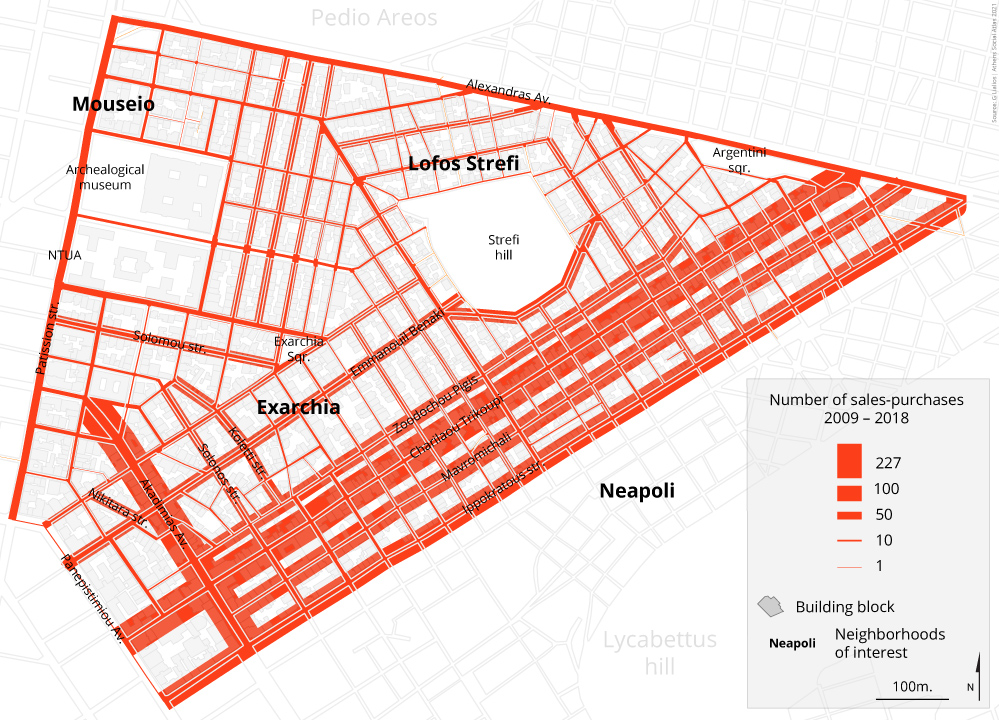
– source Athens Social Atlas
The benches of Exarcheia Square have nurtured elderly couples who have enjoyed the morning sun for many decades in the same spot. Its playground, which echoed with laughter and cries of children who passed by or lived there, are now memories or unheard stories.
The cameras and the zoning of the new construction will make certain 24 hours a day that Exarcheia is not the square we all have come to know, not even a square anymore, but an evaporated public place, a cemented crossing for men, women and families to go to work or a shopping spree (as Margaret Thatcher famously preached). The same logic runs through the third pillar of gentrification in Exarcheia, the regeneration of Lofos Strefi.
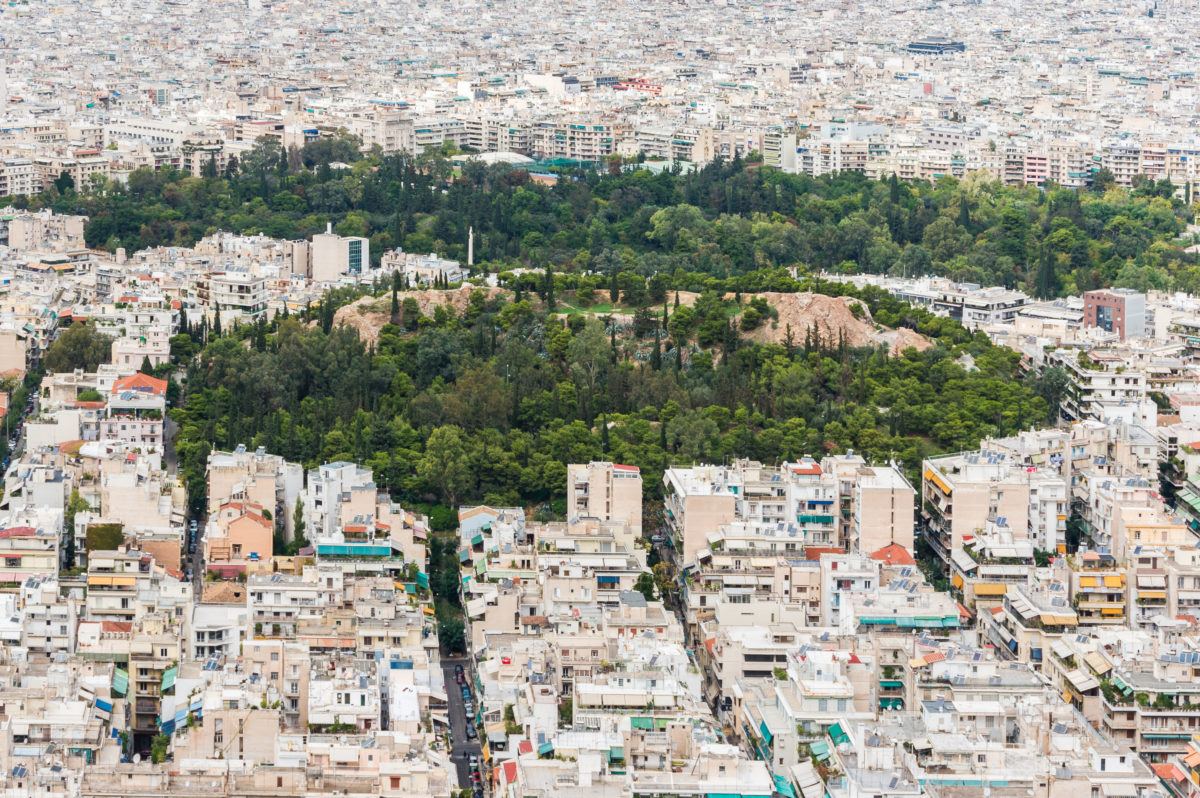
Lofos Strefi – Large Treefilled Community Hilltop Threatened
Strefi is a massive hill which is the only green lung in the immediate area, except for the 70 trees of the Square itself about five minutes’ walk away. The small grove, its paths, theater, and basketball court have been meeting, playing, and flirting points for many generations.
The theatrical plays, music bands and mystic litanies, benefit gigs and parties throughout the summer, numerous assemblies especially when ‘privacy’ is on demand and hundreds of everyday activities, from picnics to dog walking to school truancy with a forbidden love, have shaped the hill into a living playful cell of the organization of Exarcheia.
This makes the Asteras stairs the main entrance to the hill one of the most popular meeting points. (The stairs are named after the local team with its basketball court in Strefi.)

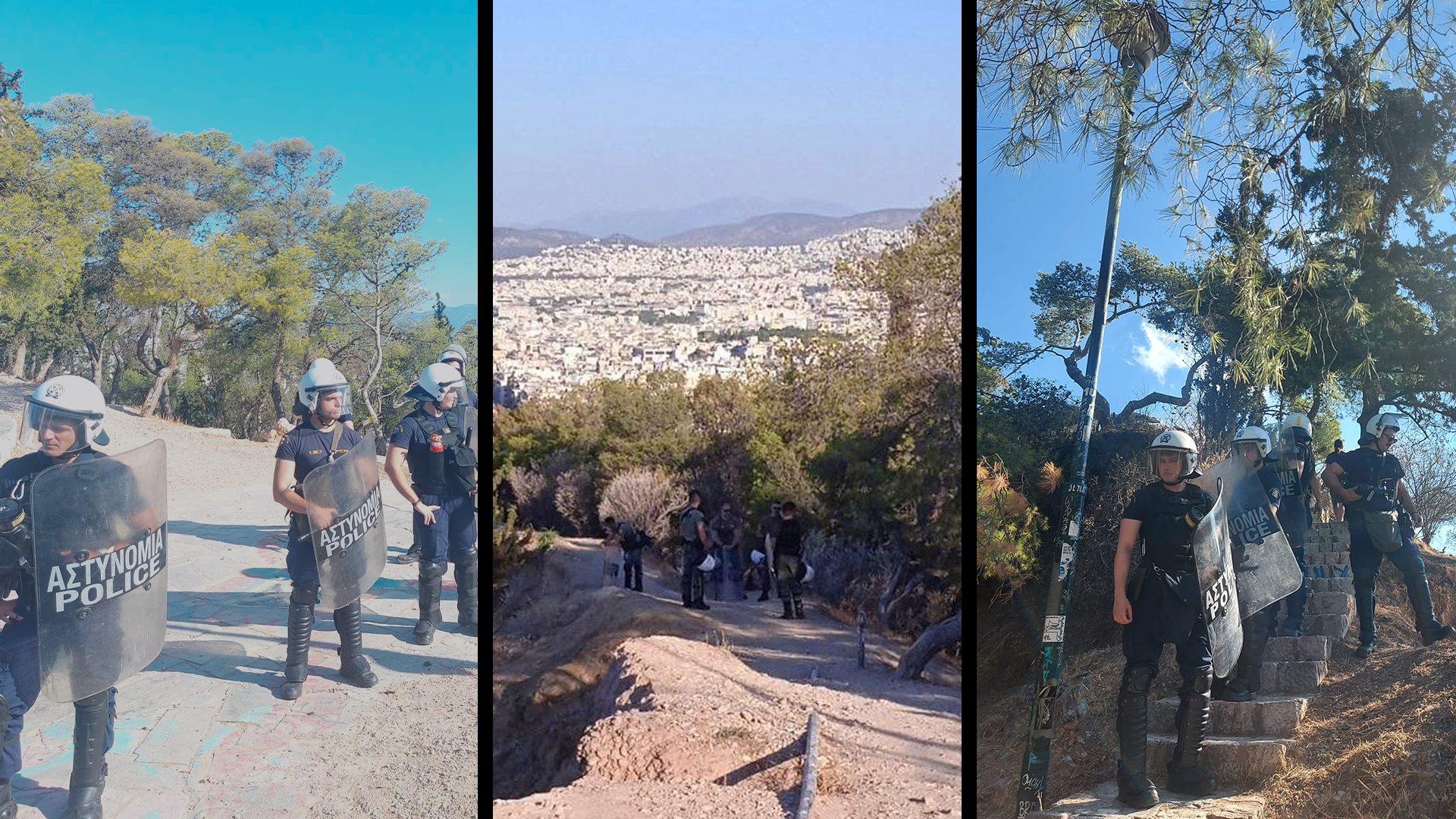
The soothing sense of freedom and serenity residents felt walking in the snow-covered Strefi in the heart of COVID quarantine, added a token of splendor. That was, until Prodea appeared.
Prodea is the biggest private real estate investment company in Greece, leaving its stamp deep in the physiognomy and future uses of the areas it reshapes. It privatizes open social spaces in favor of its interests and disregards the dynamics and history of the neighborhoods it infiltrates in the name of development.
Similar to Exarcheia Square, for the sake of regeneration, the hill will deaden and be surrounded, so that it becomes a vast working site with uniforms and batons in order to estrange the place from its users and enthusiasts, while simultaneously strengthening the message about privatization of the public space.
The security contracts for Strefi were given directly from the Mayor Bakoyannis to Unison facility services, a contractor company dealing with cleaning, security and restaurant management, handling nearly every municipality project during the mayor’s reign over the last three years.
Unison is also contracted to carry out maintenance and renovations on nearly all nine of the new metro stations on line 4: Kolonaki Square, Kypseli Square, Courts Square, the Academy Park, the Evangelism Park (Rizari), and Exarcheia Square.
What we see in Exarcheia right now is the ‘untamed’ anthropogeography of the neighborhood being mutated to controlled private land for the ‘tamed’ ones.
Protest gatherings have been ongoing and appear to be growing and unfinished. Residents of the neighborhood say “the fight is just starting.” Part two in this series will feature a deep dive into how gentrification works from its characteristics to its forms.
Part 2 – The Different Facets of Gentrification in Greece and Beyond
Part 3 – Altering Exarcheia From the Square to Strefi Hill: A Timeline and Film
For more media from Greece, see our Greece archive page.
Follow us on X (aka Twitter), Facebook, YouTube, Vimeo, Instagram, Mastodon, Threads, BlueSky and Patreon.
Please consider a tax-deductible donation to help sustain our horizontally-organized, non-profit media organization:

